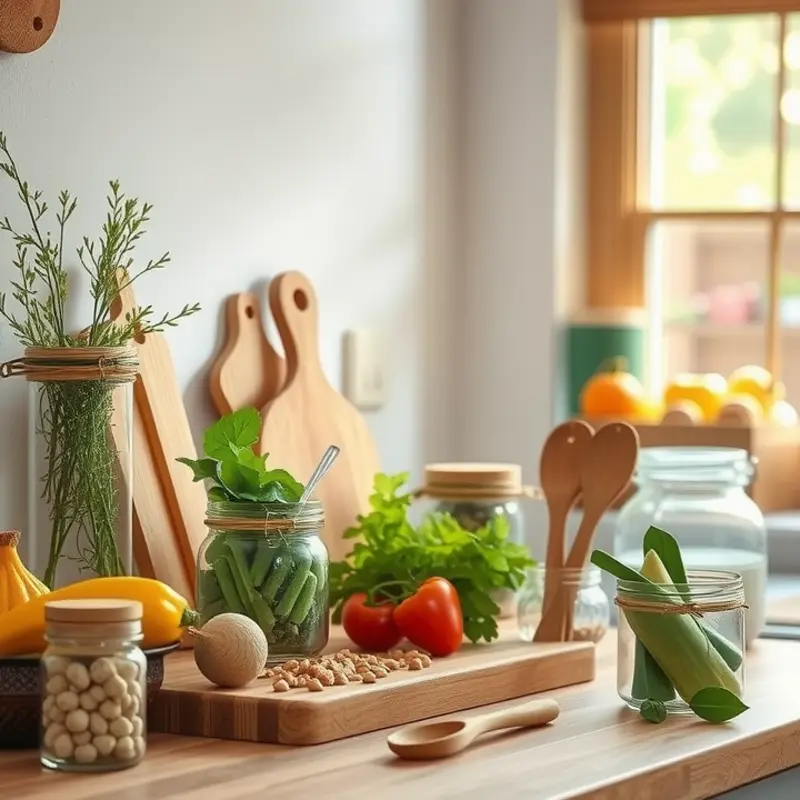Creating an eco-friendly kitchen is a rewarding but sometimes daunting task. Adopting sustainable food choices not only benefits the planet but also supports healthier eating habits. By making small, thoughtful swaps in your kitchen, you can significantly reduce your carbon footprint while enjoying delicious, guilt-free meals. From reducing plastic usage to opting for organic ingredients, the journey begins with understanding the available options and their impacts. Ready to discover some comprehensive swaps that can make a difference?
Rethink Your Utensils and Storage

Rethink Your Utensils and Storage
Transforming your kitchen into a bastion of sustainability starts with the simple act of rethinking your utensils and storage solutions. Plastic, once hailed for its convenience, has become infamous for its environmental impact. Enter bamboo, stainless steel, and glass: robust, eco-friendly alternatives that are reshaping modern kitchens.
Bamboo utensils bring the advantage of being both renewable and biodegradable. Fast-growing and requiring minimal resources, bamboo is a star in sustainable materials. These utensils often resist stains and odors, making them perfect companions for diverse cooking experiences. Additionally, bamboo’s natural antiseptic properties offer an advantage in maintaining kitchen hygiene.
On the other hand, stainless steel offers durability that outlives plastic by decades. Utensils made from stainless steel resist rust and are incredibly resilient to high temperatures. This makes them ideal for all kinds of culinary endeavors, from stovetop to grill. Furthermore, their recyclable nature ensures they do not end in landfills, contributing to a circular economy.
Glass containers redefine storage with their non-porous surface, preventing food from absorbing flavors and odors. Unlike plastic, they do not leach chemicals when used in microwaves or dishwashers. Their transparency enables clear visibility of stored content, minimizing food waste by ensuring you’re aware of what’s inside at a glance. For more insight into eco-smart kitchen storage practices, see this guide.
The shift to reusables reduces waste significantly. By choosing containers and utensils that last a lifetime, the frequency of replacing worn-out items diminishes, saving both material and financial resources. This change is supported by a growing community of eco-conscious households, proving that small shifts in consumer habits drive greater environmental impact.
Diving deeper, integrating sustainable choices encourages a broader reevaluation of traditional kitchen culture. Routine practices, such as storing leftovers or serving dinner, transform into eco-friendly actions that collectively contribute to a healthier planet. Moreover, by adopting these changes, individuals become part of a larger movement challenging the norms of disposable culture, offering future generations a more sustainable world to inherit.
In summary, switching to sustainable kitchen utensils and storage options manifests eco-friendly living at its core. By embracing bamboo, stainless steel, and glass, we not only reduce waste but also enhance our kitchens with durable, efficient tools. This choice is not merely a trend but a necessary evolution towards a sustainable future.
Embrace Organic and Local Produce

Switching to organic and locally sourced products drastically reduces your kitchen’s environmental impact. Opting for seasonal fruits and vegetables is an essential first step. These products are grown in harmony with natural growth cycles, resulting in a simultaneous reduction in energy consumption and carbon emissions. Seasonal produce doesn’t undergo energy-intensive processes like refrigeration or long-haul transportation, which conventional produce often requires.
Local farms play a crucial role in sustainable practices. By minimizing the need for packaging and transportation, local farms significantly reduce their overall carbon footprint. These farms often use biodiverse crop rotations and natural pest control which lead to healthier soil and a reduced reliance on chemicals. Sourcing food locally not only supports these sustainable practices but also preserves local ecosystems by maintaining green space and biodiversity.
Finding local farms or organic produce in your area can be simple with the right resources. Farmer’s markets, community-supported agriculture (CSA) programs, and local co-ops offer direct access to fresh products while supporting local growers. Online platforms are also available for finding nearby farms or artisan food producers. When attending farmer’s markets, take the opportunity to ask about the farms’ production methods and seasonal offerings—engaging directly provides assurance of sustainable practices.
Embracing local and organic produce enhances not just environmental sustainability but personal health. Organic farms avoid using synthetic fertilizers or harsh pesticides, leading to produce with higher levels of essential nutrients. Seasonal fruits and vegetables are harvested at their peak, providing superior taste and nutritional benefits. Moreover, consuming locally grown foods often ensures fresher and more nutritious options compared to items that have traveled long distances.
By supporting local economies, you also foster community resilience. Local farms and markets nurture community ties and generate local employment. The multiplier effect implies that money spent on local produce circulates within the community, promoting economic stability. When choosing eco-friendly food storage options, you further contribute to reducing kitchen waste, saving resources, and supporting environmental sustainability. Consider exploring tips on eco-smart kitchen storage to make your kitchen even more sustainable.
Ultimately, prioritizing organic and locally sourced products is an empowering way to make meaningful contributions to sustainability. By becoming more connected to the agricultural sources of your food, you help foster healthier lifestyles and communities, all while promoting environmental stewardship. This commitment reduces not just your carbon footprint but also enriches your tables with the freshest and most nutritious options available.
Final words
Transitioning to an eco-friendly kitchen begins with understanding the choices available to you. By swapping out traditional plastic utensils for sustainable materials and embracing organic and local produce, you contribute to a healthier planet while enhancing your meals. These small yet impactful changes not only lower your carbon footprint but also promote personal well-being. As an environmentally-conscious individual, your kitchen can serve as a beacon of sustainability and a reflection of your commitment to the environment. Remember, every small swap counts in the journey toward a cleaner, greener kitchen and a sustainable future.








